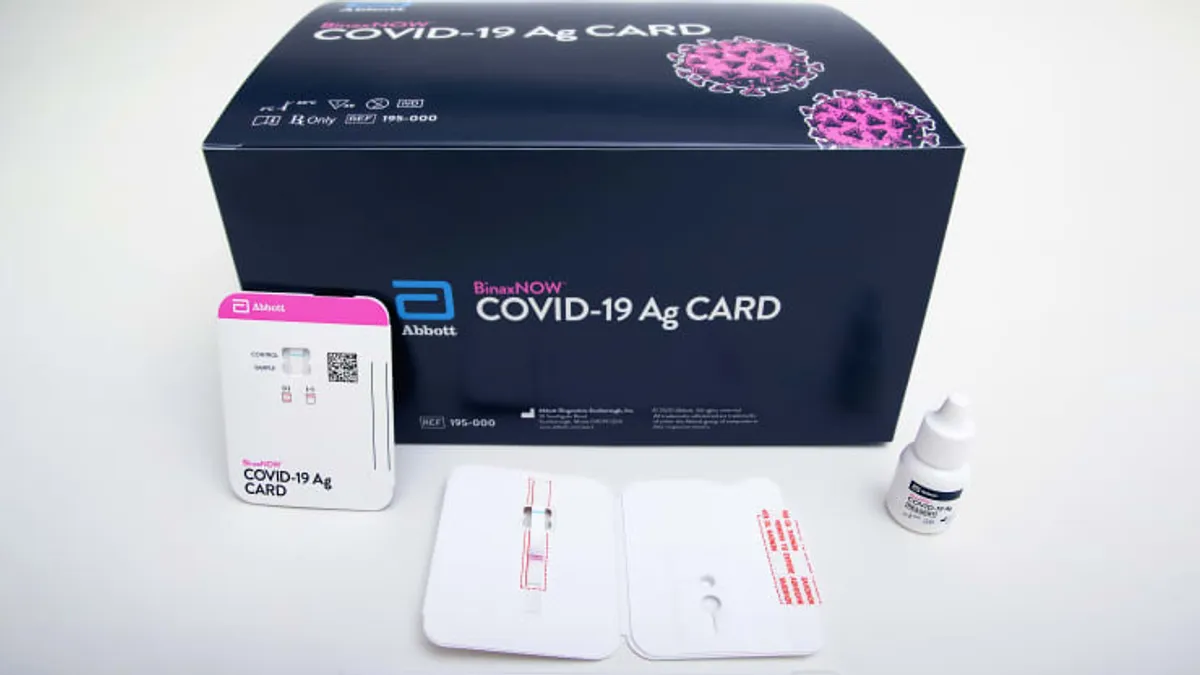Dive Brief:
- HHS on Thursday said it's buying an additional 30 million Abbott BinaxNOW Ag Card rapid tests for nursing homes, assisted living facilities, and other vulnerable groups as U.S. coronavirus cases continue to surge. The dollar value for the deal was not disclosed.
- The agency previously bought 150 million of Abbott's COVID-19 point-of-care antigen tests, which cost $5 each, under a $760 million contract awarded to the medtech giant in August, a day after it was granted an FDA emergency use authorization. HHS also said Thursday that states, territories, and tribes will be able to purchase the 15-minute Abbott tests at a fixed price through the GSA Federal Supply Schedule.
- Separately, Beckman Coulter on Friday said it is filing for emergency use authorization with FDA for a high-throughput $4 SARS CoV-2 antigen test, targeting mass COVID-19 testing.
Dive Insight:
As U.S. coronavirus cases continue to surge, companies have been ramping up production of point-of-care antigen tests that are among the cheapest and quickest tests available.
Abbott and Beckman Coulter are among the few companies that have the capability to scale up to meet the demand for antigen testing. However, there are significant differences between their products.
The $5 15-minute Abbott BinaxNOW COVID-19 Ag Card test uses nasal swabs and can be deployed by medical personnel or trained operators in certain non-clinical environments operating through a CLIA certificate.
Beckman Coulter said its foray into the antigen test market is a bid to make "reliable and frequent mass testing affordable" for healthcare providers at a $4 price while trying to address the "scalability constraints of POC tests."
The test delivers results in 30 minutes, and the company said it can immediately begin shipping 18 million tests per month and ramp up to 25 million tests by March.
The company contends that its Access SARS-CoV-2 Antigen assay, used to collect nasal swab at the point of care, is the first cost-effective, high-throughput COVID-19 test in the U.S. "with the volume, workflow and scalable flexibility." The test, which runs on Beckman Coulter's analyzers capable of processing up to 200 samples per hour, provides high throughput screening in 30 minutes.
One limitation is that it doesn't have the convenience of fully at-home antigen tests. There are now three COVID-19 diagnostics that can be completely used at home.
Abbott on Wednesday received FDA emergency use authorization for a 15-minute antigen test, making it the first at-home, virtually guided coronavirus diagnostic to get the agency's nod.
However, antigen tests have significant disadvantages as they are less likely than gold standard PCR tests to detect the virus early in the course of the infection. Antigen tests also have a higher rate of false positive results, while a negative antigen test result doesn't necessarily ensure a person doesn’t have the virus — only that no antigens were detected.
Beckman Coulter claims its assay's limit of detection is 2 to 200 times lower and therefore more sensitive than most POC antigen tests. In addition, the company contends its test is appropriate for many of the same populations as PCR tests — those suspected of COVID-19 infection by their healthcare providers.
However, FDA is now allowing antigen and molecular diagnostic tests to be used "off label" in testing asymptomatic patients, despite a University of Arizona study involving Quidel's antigen test, as reported in November by The New York Times, detecting only 32% of the positive cases among those with no symptoms identified by a PCR test.













